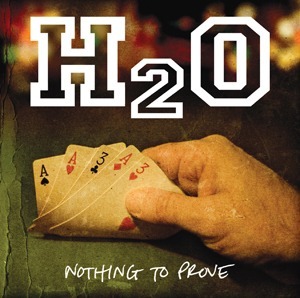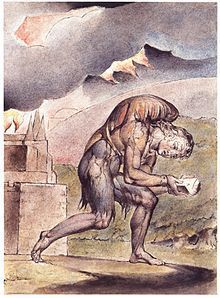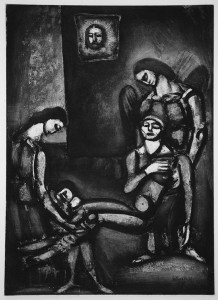Tullian Tchividjian's Blog, page 10
January 10, 2014
Antinomianism, Legalism And The Relationship Between Law And Gospel
 There is some talk these days regarding big terms like antinomianism (a word coined by Martin Luther which simply means “anti-law”) and legalism. I’ve written about that here and address it at length in Chapter 9 of One Way Love. But, at the center of any discussion regarding antinomianism and legalism is how one understands the Biblical distinction between God’s law and God’s gospel. I hope the following thoughts are helpful and further this important conversation. The theological lifting here is a bit heavy, but I think it’s worth your time and effort to think on these things.
There is some talk these days regarding big terms like antinomianism (a word coined by Martin Luther which simply means “anti-law”) and legalism. I’ve written about that here and address it at length in Chapter 9 of One Way Love. But, at the center of any discussion regarding antinomianism and legalism is how one understands the Biblical distinction between God’s law and God’s gospel. I hope the following thoughts are helpful and further this important conversation. The theological lifting here is a bit heavy, but I think it’s worth your time and effort to think on these things.
One of the problems in the current conversation regarding the relationship between law and gospel is that the term “law” is not always used to mean the same thing. This is understandable since in the Bible “law” does not always mean the same thing.
For example, in Psalm 40:8 we read: “I delight to do your will, O my God; your law is within my heart.” Here the law is synonymous with God’s revealed will. A Christian seeking to express their love for God and neighbor delights in those passages that declare what God’s will is. When, however, Paul tells Christians that they are no longer under the law (Rom. 6:14) he obviously means more by law than the revealed will of God. He’s talking there about Christians being free from the curse of the law-not needing to depend on adherence to the law to establish our relationship to God: “Christ is the end of the law for righteousness to everyone who believes” (Rom. 10:4).
 So, it’s not as simple as you might think. For short hand, I think it’s helpful to say that law is anything in the Bible that says “do”, while gospel is anything in the Bible that says “done”; law equals imperative and gospel equals indicative. However, when you begin to parse things out more precisely, you discover some important nuances that should significantly help the conversation forward so that people who are basically saying the same thing aren’t speaking different languages and talking right past one another.
So, it’s not as simple as you might think. For short hand, I think it’s helpful to say that law is anything in the Bible that says “do”, while gospel is anything in the Bible that says “done”; law equals imperative and gospel equals indicative. However, when you begin to parse things out more precisely, you discover some important nuances that should significantly help the conversation forward so that people who are basically saying the same thing aren’t speaking different languages and talking right past one another.
Discussion of the law and it’s three uses (1) usus theologicus (drives us to Christ), (2) usus politicus (the civil use), and (3) usus practicus (revealing of God’s will for living) are helpful. But I’ve discovered that this outline all by itself raises just as many questions to those I talk to as it does provide answers.
When, for instance, the Apostle Paul speaks about the law he routinely speaks of it as a command attached to a condition. In other words, law is a demand within a conditional framework. This is why he selects Leviticus 18:5b (both in Gal. 3 and Rom. 10) as a summary of the salvation-structure of the law: “if you keep the commandments, then you will live.” Here, there is a promise of life linked to the condition of doing the commandments and a corresponding threat for not doing them: “cursed is everyone who does not abide in all the things written in the Book of the Law, to do them” (Gal 3.10 citing Deut 27.26). When this conditional word encounters the sinful human, the outcome is inevitable: “the whole world is guilty before God” (Rom 3.19). It is the condition that does the work of condemnation. “Ifs” kill!
Compare this to a couple examples of New Testament imperatives. First, consider Galatians 5.1. After four chapters of passionate insistence that justification is by faith apart from works of the law, Paul issues a couple of strong imperatives: “It was for freedom that Christ set us free; therefore stand firm (imperative) and do not be subject (imperative) again to the yoke of slavery.” Are these commandments with conditions? No! Are these imperatives equal to Paul’s description of the law? No! The command here is precisely to not return to the law; it is an imperative to stand firm in freedom from the law.
 Let’s say you’re a pastor and a college student comes to you for advice. He’s worn out because of the amount of things he’s involved in. He’s in a fraternity, playing basketball, running track, waiting tables, and taking 16 hours of credit. The pressure he feels from his family to “do it all” and “make something of himself” is making him crazy and wearing him down. After explaining his situation to you, you look at him and explain the gospel-that because Jesus paid it all we are free from the need to do it all. Our identity, worth, and value is not anchored in what we can accomplish but in what Jesus accomplished for us. Then you issue an imperative: “Now, quit track and drop one class.” Does he hear this as bad news or good news? Good news, of course. The very idea of knowing he can let something go brings him much needed relief-he can smell freedom. Like Galatians 5:1, the directive you issue to the student is a directive to not submit to the slavery of a command with a condition (law): “if you do more and try harder, you will make something of yourself and therefore find life.” It’s not an imperative of conditional command; it is an invitation to freedom and fullness. This is good news!
Let’s say you’re a pastor and a college student comes to you for advice. He’s worn out because of the amount of things he’s involved in. He’s in a fraternity, playing basketball, running track, waiting tables, and taking 16 hours of credit. The pressure he feels from his family to “do it all” and “make something of himself” is making him crazy and wearing him down. After explaining his situation to you, you look at him and explain the gospel-that because Jesus paid it all we are free from the need to do it all. Our identity, worth, and value is not anchored in what we can accomplish but in what Jesus accomplished for us. Then you issue an imperative: “Now, quit track and drop one class.” Does he hear this as bad news or good news? Good news, of course. The very idea of knowing he can let something go brings him much needed relief-he can smell freedom. Like Galatians 5:1, the directive you issue to the student is a directive to not submit to the slavery of a command with a condition (law): “if you do more and try harder, you will make something of yourself and therefore find life.” It’s not an imperative of conditional command; it is an invitation to freedom and fullness. This is good news!
Or take another example, John 8.11. Once the accusers of the adulterous women left, Jesus said to her, “Neither do I condemn you. Depart. From now on, sin no more.” Does this final imperative disqualify the words of mercy? Is this a commandment with a condition? No! Otherwise Jesus would have instead said, “If you go and sin no more, then neither will I condemn you.” But Jesus said, “Neither do I condemn you. Go and sin no more.” The command is not a condition. “Neither do I condemn you” is categorical and unconditional, it comes with no strings attached. “Neither do I condemn you” creates an unconditional context within which “go and sin no more” is not an “if.” The only “if” the gospel knows is this: “if anyone sins, we have an advocate with the Father, Jesus Christ the Righteous” (1 John 2.1).
The reason Paul says that Christ is the end of this law is that in the gospel God unconditionally gives the righteousness that the law demands conditionally. So Christ kicks the law out of the conscience by overcoming the voice of condemnation produced by the condition of the law. The conditional voice that says “Do this and live” gets out-volumed by the unconditional voice that says “It is finished.”
When this happens, we are freed from the condemnation of the law’s conditionality (the “law” loses its teeth) and therefore free to hear the law’s content as a description of what a free life looks like. In other words, the gospel ends the law’s role as the regulator of the divine-human relationship and limits the law to being a blueprint for the free life–with parental consequences from our unconditionally loving father when we “submit again to a yoke of slavery.” Fatherly discipline from God when we stray off course always comes for one reason: to set us free.
So, the law serves Christians by showing us what freedom on the ground looks like. But everyday in various ways we disobey and stubbornly ignore the call to be free, “submitting ourselves once again to a yoke of slavery.” And when we do, it is the gospel which brings comfort by reminding us that God’s love for us doesn’t depend on what we do (or fail to do) but on what Christ has done for us. Jesus fulfilled all of God’s holy conditions so that our relationship to God could be wholly unconditional. “There is therefore now no condemnation for those that are in Christ Jesus” (Romans 8:1). The gospel, therefore, always has the last word over a believer. Always!
For Martin Luther, it is within this unconditional context created by the gospel-the reality he called “living by faith”-that the law understood as God’s good commands can be returned to its proper place. Wilfried Joest sums this up beautifully:
The end of the law for faith does not mean the denial of a Christian ethic…. Luther knows a commandment that gives concrete instruction and an obedience of faith that is consistent with the freedom of faith…. This commandment, however, is no longer the lex implenda [the law that must be fulfilled], but rather comes to us as the lex impleta [the law that is already fulfilled]. It does not speak to salvation-less people saying: ‘You must, in order that…’ It speaks to those who have been given the salvation-gift and say, “You may, because…”
Freed from the burden and bondage of attempting to use the law to establish our righteousness before God, Christians are free to look to “imperatives”, not as conditions, but as descriptions and directions as they seek to serve their neighbor. The law, in other words, norms neighbor love-it shows us what to do and how to do it. Once a person is liberated from the commonsense delusion that keeping the rules makes us right with God, and in faith believes the counter-intuitive reality that being made righteous by God’s forgiving and resurrecting word precedes and produces loving action (defined as serving our neighbor), then the justified person is unlocked to love-which is the fulfillment of the law.
January 6, 2014
Getting To Know The Usual Suspects Of LIBERATE
LIBERATE 2014 is 45 days away (Feb. 20-23). You need to come. You really need to come. All the info you need is here.
This is our third conference and for the past two years, this three day conference has been, hands down, my favorite three days of the year.
To get you acquainted with our speakers this year, our editor-in-chief Nick Lannon, has put together some fun facts about all of us. I promise…you’ll be surprised.
Enjoy…
Five Things To Know About Paul Tripp
Six Things To Know About Elyse Fitzpatrick
Five Things To Know About Steve Brown
Ten Things To Know About Andy Crouch
Eight Things To Know About Scotty Smith
Ten Things To Know About Sally Lloyd-Jones
Six Things To Know About David Zahl
Nine Things To Know About J.D. Greear
Six Things To Know About Matt Chandler
Ten Things To Know About Paul Zahl
Eight Things To Know About Justin Holcomb
Seven Things To Know About Me
January 4, 2014
Jesus, Our Rosetta Stone
 Step back for a moment and contemplate God’s point of view. A spirit unbound by time and space, God had borrowed material objects now and then – a burning bush, a pillar of fire – to make an obvious point on planet Earth. Each time, God adopted the object in order to convey a message and then moved on. In Jesus, something new happened: God became one of the planet’s creatures, an event unparalleled, unheard-of, unique in the fullest sense of the word.
Step back for a moment and contemplate God’s point of view. A spirit unbound by time and space, God had borrowed material objects now and then – a burning bush, a pillar of fire – to make an obvious point on planet Earth. Each time, God adopted the object in order to convey a message and then moved on. In Jesus, something new happened: God became one of the planet’s creatures, an event unparalleled, unheard-of, unique in the fullest sense of the word.
The God who fills the universe imploded to become a peasant baby who, like every infant who has ever lived, had to learn to walk and talk and dress himself. In the incarnation, God’s Son deliberately “handicapped” himself, exchanging omniscience for a brain that learned Aramaic phoneme by phoneme, omnipresence for two legs and an occasional donkey. Instead of overseeing a hundred billion galaxies at once, he looked out on a narrow alley in Nazareth, a pile of rocks in the Judean desert, or a crowded street of Jerusalem.
Because of Jesus we need never question God’s desire for intimacy. Does God really want close contact with us? Jesus gave up Heaven for it. In person he reestablished the original link between God and human beings, between seen and unseen worlds.
In a fine analogy, H. Richard Niebuhr likened the revelation of God in Christ to the Rosetta stone. Before its discovery scholars could only guess at the meaning of Egyptian hieroglyphics. One unforgettable day they uncovered a dark stone that rendered the same text in three different languages. By comparing the translations side by side, they mastered hieroglyphics and could now see clearly into a world they had known only in a fog.
Niebuhr goes on to say that Jesus allows us to “reconstruct our faith.” We can trust God because we trust Jesus. If we doubt God, or find him incomprehensible, unknowable, the very best cure is to gaze steadily at Jesus, the Rosetta stone of faith.
Philip Yancey, Reaching for the Invisible God (135-39)
December 31, 2013
On To The Next One…
 Today is the very first day of a brand new year. And for many that means renewed efforts at a fresh start. New Year’s resolutions, we call them.
Today is the very first day of a brand new year. And for many that means renewed efforts at a fresh start. New Year’s resolutions, we call them.
This is the year. It all starts now. We resolve to turn over a new leaf-and this time we’re serious. This time we’re really going to try, we’re not going to quit. We promise ourselves that we’re going to quit bad habits and start good ones. We’re going to get in shape, eat better, be more content, more disciplined, more intentional. We’re going to be better husbands, wives, fathers, mothers. We’re going to work harder, pray more, serve more, plan more, give more, read more, and memorize more Bible verses. We’re going to finally be all that we can be. No more messing around.
Well…I say try. Seriously, try. You might make some great strides this year. I’m hoping to. There are a lot of improvements I’m hoping to make over the next 12 months. But don’t be surprised a year from now when you realize that you’ve fallen short…again.
For those who try and try, year after year, again and again, to get better and better, only to take three steps forward then two steps back, one step forward then three steps back…I have good news for you: you’re in good company!
My friend Jean Larroux sent me this powerful illustration that he got from Jack Miller.
Miller recounts the valiant efforts of Samuel Johnson (a literary giant of the 18th century) to fight sloth and to get up early in the morning to pray. Taken from Johnson’s diary and prayer journal, Jack gives us a record-through the years-of Johnson’s life-long resolutions, failures, and frustrations:
1738: He wrote, “Oh Lord, enable me to redeem the time which I have spent in sloth.”
1757: (19 years later) “Oh mighty God, enable me to shake off sloth and redeem the time misspent in idleness and sin by diligent application of the days yet remaining.”
1759: (2 years later) “Enable me to shake off idleness and sloth.”
1761: “I have resolved until I have resolved that I am afraid to resolve again.”
1764: “My indolence since my last reception of the sacrament has sunk into grossest sluggishness. My purpose is from this time to avoid idleness and to rise early.”
1764: (5 months later) He resolves to rise early, “not later than 6 if I can.”
1765: “I purpose to rise at 8 because, though, I shall not rise early it will be much earlier than I now rise for I often lie until 2.”
1769: “I am not yet in a state to form any resolutions. I purpose and hope to rise early in the morning, by 8, and by degrees, at 6.”
1775: “When I look back upon resolution of improvement and amendments which have, year after year, been made and broken, why do I yet try to resolve again? I try because reformation is necessary and despair is criminal.” He resolves again to rise at 8.
1781: (3 years before his death) “I will not despair, help me, help me, oh my God.” He resolves to rise at 8 or sooner to avoid idleness.
I love the never-quit effort of Johnson. What he chronicles sounds so much like me over the years. Try and fail. Fail then try. Try and succeed. Succeed then fail. Two steps forward. One step back. One step forward. Three steps back. Every year I get better at some things, worse at others.
For example, this past year I’ve become much more patient with my children–more tolerant of their mishaps. Therefore, I’ve been enjoying them more and micro-managing them less (one step forward). I’m not as concerned to defend myself when attacked. I’ve also seen real growth in the area of how I feel toward those who criticize me–I’m much more apt to reach out to them personally rather than ridicule them privately or publicly (cha-ching, cha-ching). But, due to a lack of discipline on my part, I’ve also allowed myself to be stretched too thin this past year and as a result, those I love most have suffered (one step back). I’ve promoted myself too much and prayed too little (gong! gong!).
To complicate matters even more, when I honestly acknowledge the ways I’ve gotten worse, it’s actually a sign that I may be getting better. And when I become proud of the ways I’ve gotten better, it’s actually a sign that I’ve gotten worse. And round and round we go. Furthermore, no matter how hard I try, I still get frustrated by the same things that frustrated me 20 years ago: traffic jams, unexpected interruptions, long lines, feeling misunderstood, people who “play it safe”, and so on and so forth. You get the idea. In some ways we get better. In some ways we get worse. And in other ways we basically stay the same.
Whoever told us that the experience of “Christian living” was one of escalating progress lied to us. Most of the time it feels rather static, doesn’t it? In my opinion, there’s way too much abstract and idealistic theologizing about the Christian life these days. And because this kind of theologizing is so detached from the way we actually experience life, it doesn’t help people. I much prefer this honest and realistic description by the late Gerhard Forde:
Am I making progress? If I am really honest, it seems to me that the question is odd, even a little ridiculous. As I get older and death draws nearer, I don’t seem to be getting better. I get a little more impatient, a little more anxious about having perhaps missed what this life has to offer, a little slower, harder to move, a little more sedentary and set in my ways. Am I making progress? Well, maybe it seems as though I sin less, but that may only be because I’m getting tired! It’s just too hard to keep indulging the lusts of youth. Is that sanctification? I wouldn’t think so! One should not, I expect, mistake encroaching senility for sanctification! But can it be, perhaps, that it is precisely the unconditional gift of grace that helps me to see and admit all that? I hope so. The grace of God should lead us to see the truth about ourselves, and to gain a certain lucidity, a certain humor, a certain down-to-earthness.
What I’m most deeply grateful for (as was Samuel Johnson) is that God’s love for me, approval of me, and commitment to me does not ride on my resolve but on Jesus’ resolve for me. The gospel is the good news announcing Jesus’ infallible devotion to us in spite of our inconsistent devotion to him. The gospel is God’s promise that no matter how weak your faith and unsuccessful your efforts may be, He is always holding on to you. The glory of a new year (and of every year) is the chronicling of God’s successes perfectly meeting my failures. It’s His faithfulness, not mine, that is great–and worthy of worship.
It’s comforting to me as this new year gets under way to remember that I am weak and He is strong–that while my love for Jesus will continue to fall short, Jesus’ love for me will never fall short. For, as Mark Twain said, “Heaven goes by favor. If it went by merit, your dog would get in and you would stay out.”
Thank God!
Happy New Year!
December 27, 2013
Punk’d By Grace
 During a radio interview last week, the interviewer told me a story that gets to the heart of how grace transforms.
During a radio interview last week, the interviewer told me a story that gets to the heart of how grace transforms.
He was a camp counselor one summer and one of his responsibilities was to go around with another counselor and check the cabins every morning while the students were at breakfast. In order to motivate them to keep their cabins clean, awards were given at the morning assembly to the students who had the cleanest cabin. One morning the counselors walked into one of the cabins only to discover that it had been intentionally trashed. The students thought it would be funny to “break the law” and do the exact opposite of what they had been asked to do. Clothes everywhere. Food all over the floor. Words written on the bathroom mirrors with soap. Wet towels balled up in every corner. The place was a complete disaster.
The two counselors were speechless. The one looked at the other and asked, “What should we do?” After pausing for a moment, the guy who was interviewing me finally answered, “Let’s clean it up.” His buddy looked at him like he was crazy: “Clean it up? Are you kidding? These punks need to be punished! I’m not cleaning up their mess.” The other one said, “Well, I’m going to clean it up. And by the time I’m done with it, these kids will win the award today for the cleanest cabin.” After some moaning and groaning, his buddy decided to help him. They cleaned the whole cabin while the students were at breakfast. Picked up and folded all the clothes, scrubbed all the soap off the bathroom mirrors, vacuumed up all the food, made all the beds, and hung all the wet towels up to dry on the clothes line right outside the cabin. Then they left without saying a word to anyone.
When the students came back from breakfast, thinking they had pulled off a great prank, they couldn’t believe their eyes. They were the ones who were now speechless. They initially thought they were now going to be in double trouble. They sheepishly made their way to the morning assembly. When the award for the cleanest cabin was announced and they won, they couldn’t believe it. Instead of being punished, they were rewarded. They all found the two counselors who had cleaned up their wrecked room and begged for forgiveness. And, according to the guy who was interviewing me, those boys kept the cleanest cabin for the rest of the week.
What those boys experienced was what theologians call “double-imputation.” Not only did someone else bear their punishment (having to clean up the miserable mess they made) but they were rewarded for someone else’s “righteousness.” As my friend Scotty Smith recently said, “The gospel isn’t merely the absence of all condemnation; it’s also the fullness of God’s delight lavished on us in Christ.”
And notice…the result of this irrational act of grace toward these boys was NOT worse behavior. It was sorrow and transformation. These punks were punk’d by grace…and they would never forget it.
I close my book Surprised by Grace: God’s Relentless Pursuit of Rebels with a story (not sure if this really happened or is simply parabolic) from Civil War days before America’s slaves were freed, about a northerner who went to a slave auction and purchased a young slave girl. As they walked away from the auction, the man turned to the girl and told her, “You’re free.”
With amazement she responded, “You mean, I’m free to do whatever I want?”
“Yes,” he said.
“And to say whatever I want to say?”
“Yes, anything.”
“And to be whatever I want to be?”
“Yep.”
“And even go wherever I want to go?”
“Yes,” he answered with a smile. “You’re free to go wherever you’d like.”
She looked at him intently and replied, “Then I will go with you.”
Many fear that grace-delivered, blood-bought, radical freedom (to do, say, and be whatever we want) will result in loveless license. But as the two stories above illustrate, redeeming unconditional love alone (not law, not fear, not punishment, not guilt, not shame) carries the power to compel heart-felt loyalty to the One who gave us (and continues to give us) what we don’t deserve (2 Corinthians 5:14).
December 25, 2013
Christmas For The Weary And Heavy Laden
 Christmas is supposed to be “the most wonderful time of the year”, but for many of you it’s the most painful. It’s that time of year when budgets break, when you’re reminded of how dysfunctional your family is, when you miss the people you love who have died or left.
Christmas is supposed to be “the most wonderful time of the year”, but for many of you it’s the most painful. It’s that time of year when budgets break, when you’re reminded of how dysfunctional your family is, when you miss the people you love who have died or left.
For some of you, this is your first Christmas as a divorcee. Figuring out how to shuffle your children back and forth between you and your Ex on Christmas Day is a new pain for you. For others, you’re afraid it will be your last Christmas because of your recent diagnosis. Or, you’re afraid it will be your last Christmas with your mom because of her recent diagnosis. A lost job, a daughter who won’t even call on Christmas day, a son you haven’t talked to in three years, a father who can’t get sober, a sibling in rehab–Christmas reveals our deepest frustrations and fears, our most sincere sadness and suspicions, our brokenness and bitterness.
Christmas has a painful way of revealing why the first Christmas was so necessary.
Tears are falling, hearts are breaking; How we need to hear from God…
Christmas exposes our desperation but it also announces our Deliverer—the one who promises rest to the weary and heavy laden; the one who promises never to leave us or forsake us. For those who feel lonely and lost, anxious and abandoned, tired and tense—for those who are guilt-ridden and grieving—Christmas is for you. Especially for you!
The Incarnation of Jesus serves as a glorious reminder that God’s willingness to clean things up is infinitely bigger than our capacity to mess things up. It is the fulfillment of God’s promise to confront our misery with his mercy, our confusion with his comfort, our guilt with his grace.
Christmas is the beachhead of God’s campaign against sin and sadness. It is the coming of light, life, and love into the occupied territory of darkness, death, and hate. Christmas is a war fought by a Peaceful Prince whose battle plan is to defeat death by dying, fear by forgiveness and slavery by salvation.
Christmas sets in motion the Divine pattern of God drawing near to us–not because we’ve done it right–but because we keep doing it wrong. Jesus came down to us because we are weak, not because we are strong.
Christmas highlights the inescapable fact that no matter how hard we try, we can’t do it. Apart from the Incarnation we are left to our own bankrupt resources. But at the same it shows us Jesus, who came to liberate us from the pressure of having to fix ourselves (and others!), find ourselves, and free ourselves. He came to relieve us of the burden we inherently feel “to get it done” and make it on our own. He came to set us free from the need to secure for ourselves the affection and approval we long for but cannot attain.
In short, Christmas is God’s answer to the slavery of self-salvation. From the cries of a baby lying in a manger, God shouts, “I’ve got this. I’ll take it from here.”
Fragile finger sent to heal us, Tender brow prepared for thorn; Tiny heart whose blood will save us, Unto us is born.
It is this crying baby that wipes away our tears as our Wonderful Counselor. It is this powerless child that conquers despair and dejection as our Mighty God. It is this needy newborn that is the source of everything we need and long for as our Everlasting Father. It is this helpless infant that restores okayness to our lives as our Prince of Peace.
As Everything, he became nothing so that you–as nothing–could have everything.
Merry Christmas, everyone!
December 21, 2013
I’ll Never Again Run Alone
 My friend Callie has been on an amazing journey recently. Like Brennan and Kandace (and every other human being that’s ever lived) Callie is one more living testimony to the fact that God’s grace is understood and appreciated to the degree that you know your own desperation and helplessness:
My friend Callie has been on an amazing journey recently. Like Brennan and Kandace (and every other human being that’s ever lived) Callie is one more living testimony to the fact that God’s grace is understood and appreciated to the degree that you know your own desperation and helplessness:
This was so much bigger than me and I had to let go – give up control to, well, God I guess. That’s what I was thinking the day after my initial diagnosis when I tried to run away from cancer. On that run, I imagined that the unknown was nipping at my heels and I was barely keeping one step ahead of it. Everything about my world was magnified on this run – much like it was when I sat in my car trying to make sense of the week’s events and every emotion overtaking me. And I felt very small – like I could just slip in between the snow crystals glistening and gradually melting at the edge of the sidewalk. Every footfall seemed to harmonize with my beating heart and rhythmic breath. I finished the run feeling an odd sense of blessing.
That night, I wrote about it. And when I did, I uncovered something unexpected. I learned that on that run, I wasn’t running away from cancer as much as I was running toward God. I gave up and gave in. The rest was in His hands.
Read the whole thing here.
December 19, 2013
One Way Love And Wrecking The Car
 In One Way Love, I recall a story that my friend Dr. Rod Rosenbladt told me over dinner one night in Chicago–a true story of how he’d wrecked his car when he was sixteen years old.
In One Way Love, I recall a story that my friend Dr. Rod Rosenbladt told me over dinner one night in Chicago–a true story of how he’d wrecked his car when he was sixteen years old.
Rod had been drinking, and in fact, he and his friends were all drunk. After the accident, Rod called his dad and the first thing his dad asked him was, “Are you all right?” Rod assured him that he was fine. Then he confessed to his father that he was drunk. Rod was naturally terrified about how his father might respond. Later that night, after Rod had made it home, he wept and wept in his father’s study. He was embarrassed, ashamed, and guilty. At the end of the ordeal, his father asked him this question: “How about tomorrow we go and get you a new car?”
Rod now says—and he has lived a lot of life, being seventy years-old now—that he became a Christian in that moment. God’s Grace became real to him in that moment of forgiveness and mercy. Rod has since spent his life as a servant of Christ, as spokesman for the theology of grace at Concordia University and co-host on the White Horse Inn radio program. The grace that Rod’s father showed him didn’t turn him into a drunk—it made him love his father and the God his father served.
Now let me ask you: what would you like to say to Rod’s dad? Rod says that every time he tells that story in public, there are always people in the audience who get angry. They say, “Your dad let you get away with that? He didn’t punish you at all? What a great opportunity for your dad to teach you responsibility!” Rod always chuckles when he hears that response and says, “Do you think I didn’t know what I had done? Do you think it wasn’t the most painful moment of my whole life up to that point? I was ashamed; I was scared. My father spoke grace to me in a moment when I knew I deserved wrath … and I came alive.”
Isn’t that the nature of grace? We know that we deserve punishment and then, when we receive mercy instead, we discover grace. Romans 5:8 reads, “While we were yet sinners, Christ died for us” (KJV). In other words, God gave us his best while we were at our worst. God gives forgiveness and imputes righteousness to us while we are weak, ungodly, sinful; while we are His enemies (Rom. 5:6, 8, 10). Our offenses are infinitely greater than a sixteen-year-old getting drunk and wrecking his car, yet God boasts about pouring out His one-way love on His undeserving children. No one had to tell Rod to be sorry for his foolishness. No one had to tell Rod to be thankful that his dad didn’t repay him “as his sins deserved.” That one act of grace and mercy transformed him—and his whole life was changed by it. Because that’s what grace does.
As Charles Spurgeon said beautifully, “Men are steeled rather than softened by a sense of condemnation. But remove the burden of their guilt and they will be dissolved by love! Forgiving love is the main instrument in transforming men from rebels into friends. Free pardon is a great conqueror.” Grace is the only thing that can transform entitled boys and girls into grateful men and women.
December 18, 2013
Exploring One Way Love At LIBERATE 2014
Whoever said life is a two-way street was on to something. Reward and punishment, this for that, reciprocity—whatever you want to call it—defines more than just our economy. Our relationships, our careers, our institutions also run on the principle of “I’ll do X for you, if you do Y for me.” Everything in our world demands two-way love. Everything’s conditional. If you love me, only then will I love you. If you give to me, only then will I give to you. If you serve me, only then will I serve you. This conditionality plagues us at every turn and keeps us enslaved to fear, reservation, and insecurity. The talk of owing and deserving seems to be written into the fabric of human nature and civilization. It’s how our world works.
Thankfully, grace isn’t from our world. It’s otherworldly. God’s love is different from our love. Our love is two-way—it’s conditional. God’s love is one way—it’s unconditional. And it’s this kind of love that can alone change our hearts and set us free.
Join me, Matt Chandler, Steve Brown, Scotty Smith, Elyse Fitzpatrick, David Zahl, Paul Tripp, Andy Crouch, J.D. Greear, Justin Holcomb, Jim Belcher, Paul Zahl, Dan Seidell, and Sally Lloyd-Jones on February 20-23, 2014 at Coral Ridge Presbyterian Church in Fort Lauderdale as we explore God’s One-Way Love in the Christian life, personal failure, families, the church, pop-culture, and more. Our prayer is that Liberate 2014 will be a resting place for you, your family, your friends, your pastors, and your church leaders.
Find out everything you need to know here. Register today.
LIBERATE 2014 from Coral Ridge | LIBERATE on Vimeo.
December 16, 2013
Nothing That Is Possible Can Save Us
Below, my good friend and colleague David Zahl provides the best Advent devotion I’ve read in a long time:
“She will give birth to a son, and you are to give him the name Jesus, because he will save his people from their sins.” (Matthew 1:21)
The poet W.H. Auden once wrote, “Nothing that is possible can save us/ We who must die demand a miracle.” This is a bold statement, and one whose truth might not be self-evident in everyday life. Many of the problems we face on a daily level can be fixed, or at least, addressed: If our car breaks down, we can take it to the garage. If we get a headache, we can take some aspirin. If we say something mean, we can apologize, and so on.
 Auden’s meaning becomes clearer when we consider problems of a less everyday nature. The kind that keep us up at night. I was speaking with a friend recently who had just separated from his wife. He told me, “I’ve done everything I can think of. Even couples’ counseling hasn’t helped. She just doesn’t want me. It’s going to take a miracle to save our marriage.” He had pursued all the right options, and nothing had worked. The problem was simply beyond him. So it is with us. Our condition is not fixable. That is, we can empirically say that the solution to human nature has not been found in the realm of “what’s possible.” Instead, we need a miracle to save us – from ourselves, from our sin, and ultimately, from death.
Auden’s meaning becomes clearer when we consider problems of a less everyday nature. The kind that keep us up at night. I was speaking with a friend recently who had just separated from his wife. He told me, “I’ve done everything I can think of. Even couples’ counseling hasn’t helped. She just doesn’t want me. It’s going to take a miracle to save our marriage.” He had pursued all the right options, and nothing had worked. The problem was simply beyond him. So it is with us. Our condition is not fixable. That is, we can empirically say that the solution to human nature has not been found in the realm of “what’s possible.” Instead, we need a miracle to save us – from ourselves, from our sin, and ultimately, from death.
It should comes as no surprise that the birth of the one “who will save his people from their sins” was full of the Impossible. Mary’s pregnancy is merely the first part. Equally miraculous is the fact that Joseph actually believes what the angel tells him here. And he not only believes, he obeys. These are miracles! To explain them away or downplay their importance is to deny the extent of the Good News.
Is there a situation in your life where nothing short of a miracle will help? An impossible problem or person that just won’t go away? This passage gives us permission to acknowledge that some problems are indeed too big for us. You are not imagining things – “we who must die demand a miracle”. Yet the “glad tidings” of Christmas are that Jesus is the miracle we have been waiting for, the one who saves us. The impossible problems of this life have found their impossible answer in him. Repeat the sounding joy!
(The above first appeared in the must-have Mockingbird Devotional)
Tullian Tchividjian's Blog
- Tullian Tchividjian's profile
- 142 followers



